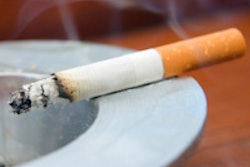Secondhand smoke is accountable for 42,000 deaths annually to nonsmokers in the U.S., including nearly 900 infants, according to a new University of California, San Francisco (UCSF) study published in the American Journal of Public Health (September 20, 2012).
Altogether, annual deaths from secondhand smoke represent nearly 600,000 years of potential life lost -- an average of 14.2 years per person -- and $6.6 billion in lost productivity, amounting to $158,000 per death, the researchers noted.
The study, which involved the first use of a biomarker to gauge the physical and economic impacts of cigarette smoke, revealed that secondhand smoke exposure disproportionately affects African Americans, especially black infants.
The researchers used serum cotinine -- a biomarker that detects the chemical consequences of exposure to tobacco smoke in the bloodstream -- to measure exposure to secondhand smoke. That measurement reflects secondhand exposure in all settings, not just home or work, the researchers wrote.
While fewer people are smoking and many have made lifestyle changes, this research shows that the impacts of secondhand smoke are still very large, noted Wendy Max, PhD, a professor of health economics at the UCSF School of Nursing and co-director of the UCSF Institute for Health & Aging, in a university press release.
The availability of information on biomarker-measured exposure allowed her and her fellow researchers to more accurately assess the impact of secondhand smoke exposure on health and productivity, she added.
The study shows that the statistics on fatalities resulting from for ischemic heart disease are 25% lower than previously reported (34,000 deaths compared with 46,000), but nearly twice as high for lung cancer deaths (7,333 deaths compared with 3,400). The new study also shows higher infant mortality (863 deaths compared with 776).
Mortality was measured in two conditions for adults: lung cancer and ischemic heart disease; and four conditions for infants: sudden infant death syndrome, low birth weight, respiratory distress syndrome, and other respiratory conditions of newborns.
Of the 42,000 total deaths resulting from secondhand smoke, 80% were white, 13% were black, and 4% were Hispanic. The vast majority of deaths were caused by ischemic heart disease. Black babies accounted for a startling high 24% to 36% of all infant deaths from secondhand smoke exposure, the researchers reported, although blacks represented only 13% of the total U.S. population in 2006.
The value of lost productivity per death was highest among blacks ($238,000) and Hispanics ($193,000).



















